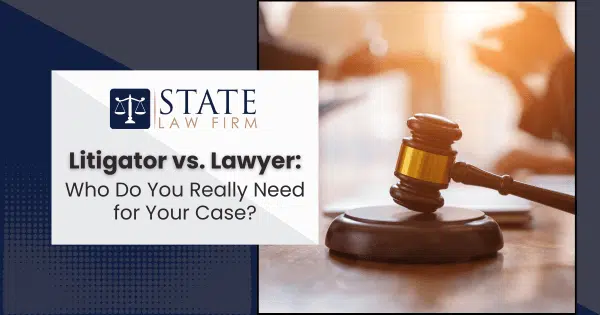When a legal problem lands on your desk, the first question is often simple: Who should I call? Many people use “lawyer,” “attorney,” “trial lawyer,” and “litigator” interchangeably, yet the roles are not always the same. Understanding the differences helps you hire the right professional for your situation, save time, and set realistic expectations about process, cost, and outcomes.
Understanding the Basics: What a Lawyer Does
A lawyer is a licensed professional who advises and represents people and businesses in legal matters. Think of “lawyer” or “attorney” as the broad category. Within that category are many practice types. Some lawyers focus on transactions, such as forming companies, negotiating contracts, or closing real estate deals. Others focus on disputes, which is where litigation comes in.
What a generalist or non-litigation lawyer typically handles:
- Counseling on rights and risks, and drafting or reviewing documents
- Negotiating agreements to prevent disputes or resolve them early
- Coordinating with specialists, investigators, and experts
- Helping you choose the right forum and strategy, including settlement
When your problem is preventive or deal-focused, a non-litigation lawyer may be the best first call. When the dispute cannot be resolved on paper or by negotiation, you are likely in litigator territory.
What a Litigator Does: From Demand Letter to Verdict
A litigator is an attorney who handles contested matters in and around the courtroom. They manage the lawsuit lifecycle from the moment a dispute escalates through settlement or trial, and sometimes appeal. The work is rigorous and deadline-driven. It includes:
- Pre-suit investigation and strategy, including preservation of evidence and demand letters
- Filing or answering complaints, motions to dismiss, and jurisdiction or venue challenges
- Discovery, including subpoenas, depositions, expert reports, and e-discovery management
- Dispositive motions and Daubert or expert challenges
- Settlement conferences, mediation, and arbitration when appropriate
- Trial preparation, witness examination, and verdict strategy
- Post-trial motions and appeals where needed
Good litigators are equal parts strategist and storyteller. They build leverage early, pressure the other side with targeted discovery and motion practice, and position your case to settle on favorable terms or succeed at trial if settlement fails.
Litigator vs. General Lawyer: The Differences That Affect Your Case
Scope and setting. A general lawyer may keep you out of disputes through careful drafting and negotiation. A litigator lives in the dispute environment. If you are already facing a lawsuit, or you need to file one to protect your rights, a litigator is the specialist you hire.
Tools and timelines. Litigation runs on procedural rules, motions, deadlines, and the rules of evidence. The process can be lengthy. A transactional matter runs on deal calendars and counterparties’ approvals, which can be faster when the parties are aligned.
Resolution paths. Most civil cases resolve before trial through dismissal, settlement, mediation, or arbitration. A litigator understands how to use each path to your advantage and when to keep pushing toward a courtroom.
Risk and leverage. In disputes, leverage comes from evidence, credible trial readiness, and the ability to survive or win key motions. Litigators develop this leverage by building the record and showing the other side they are prepared to try the case.
How to Decide Whom to Hire: A Simple Decision Framework
Use this quick checklist to match your problem with the right professional.
- Define the problem precisely.
- Is it a dispute with deadlines or court papers already in play. Hire a litigator.
- Is it a contract, entity, or compliance need. Start with a non-litigation lawyer.
- Identify the forum.
- Court, arbitration, or administrative agency points to litigation counsel.
- Negotiation or deal table points to transactional counsel, with litigation backup if talks fail.
- Assess the stakes and urgency.
- Imminent hearings, restraining orders, or evidence at risk call for a litigator now.
- Routine documents or deals with thoughtful timelines fit a non-litigation lawyer.
- Map the path to resolution.
- Ask for a 90-day plan. In disputes, that plan should cover preservation steps, initial motions, discovery targets, and settlement opportunities. In deals, it should cover key terms, due diligence, and closing milestones.
- Check experience with your fact pattern.
- Personal injury, product liability, employment, and mass-tort claims benefit from litigators who routinely appear in those courts and understand local practice.
- Founders, investors, and property owners benefit from lawyers who draft and negotiate those specific agreements daily.
If your dispute is a vehicle collision or insurance fight, start with plaintiff-side litigation counsel that handles those cases regularly. Get answers fast in our guide on Car accident lawyers, including deadlines, insurance tactics, and what paperwork matters. https://statelawfirm.com/car-accident-lawyers/san-jose/
Cost, Fee Arrangements, and Efficiency: What to Expect
How lawyers charge. You will usually see three models:
- Contingency fee. Common in personal injury and many plaintiff matters. You pay only if there is a recovery, and the attorney’s fee is a percentage of that recovery. Case costs such as filing fees, depositions, and experts are itemized and explained in the agreement.
- Hourly fee. Common in defense and business disputes, and for complex advice. You pay for time spent, plus costs. Ask about staffing, budget ranges, and when senior lawyers will be involved.
- Flat or alternative fees. Fixed-fee phases, success fees, or subscriptions for well-defined tasks. These can increase predictability when scope is known.
Ways to control costs without harming your position.
- Align on goals and off-ramps before filing. Decide whether you want injunctive relief, a quick settlement, or a precedent.
- Use early evaluation. Ask your litigator for a strengths and weaknesses memo within the first 30 to 60 days.
- Prioritize discovery with impact. Focus on evidence that moves damages, liability, or defenses, not everything that might be interesting.
- Leverage mediation at the right time. Mediation works best after the key documents and a few depositions clarify the risk on both sides.
Hidden cost drivers to watch. E-discovery volumes, multiple expert witnesses, and motion practice can expand budgets quickly. Sophisticated litigators phase these tasks, negotiate sensible ESI protocols, and use targeted experts rather than every possible specialist.
When a Litigator Is Essential
- You have been served. Answer deadlines are short and missing them can lead to default judgments. A litigator files appearances, preserves defenses, and keeps you on the court’s calendar.
- Evidence is at risk. Videos overwrite, vehicles get repaired, and phones get traded in. A litigator issues preservation letters, secures inspections, and moves for protective orders when needed.
- You need court-ordered action. Restraining orders, injunctions, and writs require a litigator’s motion practice and courtroom advocacy.
- Your case involves multidistrict litigation or coordinated proceedings. Complex cases benefit from lawyers who know how to navigate leadership structures, case management orders, and bellwether schedules.
- The other side will not negotiate in good faith. Trial readiness often unlocks settlement leverage. Litigators create that leverage.
When a Non-Litigation Lawyer Is the Right First Call
- You are starting, buying, or selling a business. Entity selection, operating agreements, and purchase agreements are transactional work.
- You want to prevent disputes. Strong contracts, clear indemnities and insurance requirements, and tailored dispute clauses prevent emergencies later.
- You are resolving a disagreement by agreement. Negotiated separations, releases, and amendments often close without court involvement when a skilled deal lawyer handles them.
Practical Next Steps
- Document the facts early. Dates, communications, photos, and names of witnesses help any lawyer evaluate your options quickly.
- Collect your paperwork. Contracts, insurance policies, medical records, police reports, and prior correspondence should be organized and ready to share.
- Ask three questions in your first call.
- What is my deadline this month?
- What is the fastest credible path to resolution?
- What evidence will make the biggest difference?
- Choose the forum to fit your goals. The court gives you formal discovery and the power to compel testimony. Mediation gives you control and privacy. Arbitration can be faster, but appeals are limited. Discuss pros and cons with counsel before you lock in.
- Align on budget and communication. Ask for a phased plan, regular updates, and a clear escalation protocol if facts change.
Every attorney is a lawyer, but not every lawyer is a litigator. If your problem is a dispute that may require court filings, discovery, or trial, you need a litigator who builds leverage and prepares to win. If your goal is to structure a deal or prevent conflict, a non-litigation lawyer is the right fit. When in doubt, call a firm that does both, describe your facts and deadlines, and let the team route you to the professional who will move your problem toward a lasting solution.


